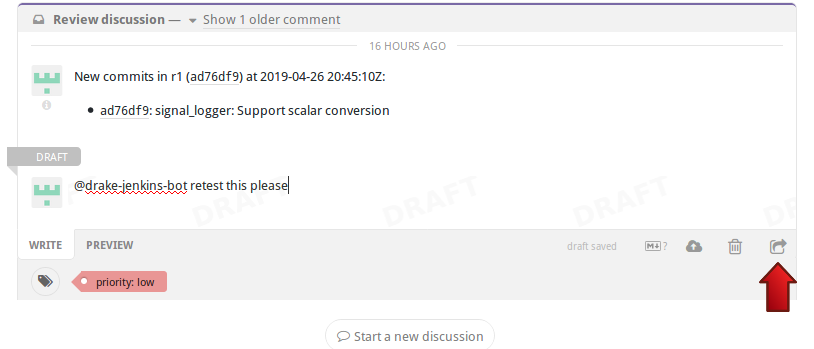When a new pull request is opened in the project and the author of the pull request is not a member of the RobotLocomotion GitHub organization, the Jenkins GitHub Pull Request Builder @drake-jenkins-bot will not automatically schedule builds.
To allow the pull request to be tested, a member of the RobotLocomotion organization may comment:
@drake-jenkins-bot ok to testto accept this pull request for testing.@drake-jenkins-bot test this pleasefor a one time test run.
If the build fails for other various reasons you can rebuild:
@drake-jenkins-bot retest this pleaseto start a new build.
You can also view the Jenkins UI directly.
When posting a @drake-jenkins-bot ... please comment in Reviewable,
never use the large green "Publish" button in the upper right corner.
Instead, write the bot comment in the "Review discussion" box immediately below the "File Matrix" widget and use the "single message send" button to post it, in the lower-right corner of the "Review discussion" box.
(For details, see Reviewable#576.)
There are a number of Jenkins builds that do not normally run pre-merge, but do
run post-merge, nightly, or weekly. These builds include lower-priority
platforms (e.g., macOS), and specialized options (e.g.,
UndefinedBehaviorSanitizer).
Members of the RobotLocomotion organization can manually schedule these builds
on pull requests that have not yet been merged, or on arbitrary commits in the
RobotLocomotion/drake repository.
To schedule a build of an open pull request merged with master, comment:
@drake-jenkins-bot <job-name> please
where <job-name> is the name of an
experimental job.
For example:
@drake-jenkins-bot mac-catalina-clang-bazel-experimental-release please@drake-jenkins-bot linux-bionic-clang-bazel-experimental-valgrind-memcheck please
Alternatively, to schedule a build of an open pull request or arbitrary commit
in the RobotLocomotion/drake repository:
- Log in to Jenkins using GitHub OAuth. (Make sure that you see your name the upper-right corner, not the words "Log in".)
- Go to the list of experimental builds.
- Click on the specific build you want to schedule.
- Click on "Build with Parameters" in the left menu.
- Enter
pr/XYZ/head(HEAD of pull request),pr/XYZ/merge(pull request merged with master), or the desired commit SHA in thesha1field. - Click
Build.
The list of experimental builds includes builds that automatically run on opened and updated pull requests, as well as numerous other builds for on-demand use. To help identify the on-demand build you want to run, you can consult the lists of continuous, nightly, and weekly builds, but you should not schedule continuous, nightly, or weekly builds directly.
Installation prerequisites are packages that are not pulled in Bazel, but
instead installed on the OS itself using a package manager like apt,
Homebrew, or pip (only on Mac). They are installed via the scripts under
setup/, and are split between binary_distribution (dependencies that
are necessary for :ref:`binary installation <binary-installation>`) and
source_distribution (dependencies, in addition to those in
binary_distribution, necessary for
:ref:`source installation <build_from_source>`). Since
source_distribution will also install prerequisites in
binary_distribution, you do not need to duplicate binary prerequisites in
source_distribution.
When updating prerequisites with these scripts, the normal experimental CI will most likely fail. To test new prerequisites, you should first request unprovisioned experimental builds, e.g.:
@drake-jenkins-bot linux-bionic-unprovisioned-gcc-bazel-experimental-release please@drake-jenkins-bot mac-catalina-unprovisioned-clang-bazel-experimental-release please
After this has passed, go through normal review. Once normal review is done,
add @jamiesnape for review and request that the provisioned instances be
updated. He will then respond on when it is appropriate to merge the PR.
To schedule an "experimental" build of the :ref:`binary packages <binary-installation>`, comment on an open pull request as follows:
@drake-jenkins-bot linux-bionic-unprovisioned-gcc-bazel-experimental-snopt-packaging please@drake-jenkins-bot mac-mojave-unprovisioned-clang-bazel-experimental-snopt-packaging please
or follow the :ref:`instructions above <scheduling-builds-via-the-jenkins-user-interface>` to schedule a build of one of the following jobs from the Jenkins user interface:
- linux-bionic-unprovisioned-gcc-bazel-experimental-snopt-packaging
- mac-mojave-unprovisioned-clang-bazel-experimental-snopt-packaging
The URL from which to download the built package will be indicated in the Jenkins console log for the completed build, for example:
-- Uploading package archive 1 of 1 to AWS S3... upload: drake-<yyymmddhhmmss>-<commit>-<bionic|mac>.tar.gz to s3://drake-packages/drake/experimental/drake-<yyymmddhhmmss>-<commit>-<bionic|mac>.tar.gz -- Package URL 1 of 1: https://drake-packages.csail.mit.edu/drake/experimental/drake-<yyymmddhhmmss>-<commit>-<bionic|mac>.tar.gz -- Uploading package archive checksum 1 of 1 to AWS S3... upload: drake-<yyymmddhhmmss>-<commit>-<bionic|mac>.tar.gz.sha512 to s3://drake-packages/drake/experimental/drake-<yyymmddhhmmss>-<commit>-<bionic|mac>.tar.gz.sha512
